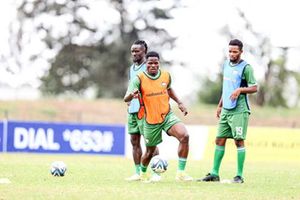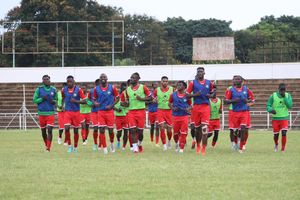
Harambee Stars player Jonah Ayunga trains at Utalii grounds on March 18, 2024.
One thing was unusual on August 27 when Harambee Stars coach, Engin Firat, named a provisional squad for Kenya’s matches of the 2025 Africa Cup of Nations (Afcon) qualifiers against Zimbabwe, and Namibia in Group ‘J’.
Of the 28 players Firat called to camp, only one - striker Jonah Ayunga who plies his trade at Saint Mirren in the Scottish Premier League - was of mixed nationality. This was strange because the 54-year-old Turk has in the recent past openly advocated for calling up of Kenyans with mixed nationality to the national team to improve performance.
Since his appointment in 2021, Firat has called up at least 10 players of mixed nationality to Harambee Stars.
They include Jonah Ayunga who was born in England but is based in Scotland, Daniel Anyembe (born and based in Denmark), Nabilai Kabunguchy (US), Vincent Harper (born in Kenya but based in England), Alfred Scrivens (born in Kenya but based in Norway), Clarke Oduor (born in Kenya but based in England), Wilkins Ochieng (born in Kenya but based in Slovenia), Philip Mayaka (born in Kenya but based in US), Zack Vyner (England), Tobias Knost (Germany), Adam Wilson (England), and Bruce Kamau (born in Nairobi but based in Australia).
These players have an option of playing for other countries because of their parentage.
So why is Ayunga the only player of mixed nationality in Kenya’s upcoming 2025 Afcon qualifier matches?
Coach Firat has said a long-drawn process of acquiring the necessary documentation for the players, including issuance of a Kenyan passport, is to blame.
The Directorate of Immigration and Registration of Persons in Kenya is responsible for the documentation of all persons in Kenya.
“I wanted to invite two new players for this September (2025 Afcon qualifiers) but in Kenya, it is not so simple with the passport issue. I have no clue of how it works,” a dejected Firat on Sunday during team training session at Police Sacco Stadium in Nairobi.
Harambee Stars host Zimbabwe at Mandela National Stadium in Kampala on Friday, before visiting Namibia at Orlando Stadium in Johannesburg on Tuesday next week.
Kenya and Namibia are hosting the matches in foreign countries since they all lack stadiums that meet Fifa and Caf’s standards for hosting international football matches.
According to Fifa’s rules, any player who has not featured either in full or in part in any official competition as a senior is eligible to play for a new representative team.
But the player must meet one of the following rules; He or she must have been born in the territory of the relevant association, one of his/her biological parents or grandparents must have been born in the territory of the relevant association, and he or she must have lived continuously for at least five years after reaching the age of 18 on the territory of the relevant association.
Yesterday, a source conversant with the process of getting foreign players with Kenyan roots to be eligible to play for the country said it is complex because it involves change of nationality.
The source, who spoke to Nation Sport in confidence for fear of victimisation since he is not authorised to speak on such matters, said some of the players in Kenya’s situation lacked the documents needed for the process, and it can take long time to find them.
Firat has on many occasions said that Kenyan leagues do not have enough quality players to serve the national teams, thus his decision to try to convince players with Kenyan parentage abroad to accept to play for Harambee Stars.
Ayunga, 27, who was born in England to a Kenyan father and English mother, plays for Saint Mirren FC in the Scottish Premiership.
Defenders Zack Vyner and Tobias Knost missed Kenya’s 2026 Fifa World Cup qualifier matches against Burundi and Cote d’Ivoire in Lilongwe last June due to complications that arose in their paperwork.
Vyner who was born in England had not yet acquired a Kenyan passport, and Knost had not been cleared by the German football federation after he made a late request. He represented Germany at the junior level.
The other players of mixed nationality whom Firat has previously called up are defenders Daniel Anyembe who was born to a Kenyan father and Danish mother, Viborg Nabilai Kabunguchy who was born in the United States of America, and Vincent Harper who was born in Kenya to a Spanish mother.
The rest are Alfred Scrivens whose father is English but with a Kenyan mother, England-based midfielder Clarke Oduor, Wilkins Ochieng who has represented Belgium at the youth level, and US-based Philip Mayaka.
TARGETED PLAYERS
Jonah Ayunga (Born in England but based in Scotland)
Daniel Anyembe (Denmark)
Nabilai Kabunguchy (US)
Vincent Harper (Born in Kenya but based in England)
Alfred Scrivens (Born in Kenya but based in Norway)
Clarke Oduor (Born in Kenya but based in England)
Wilkins Ochieng (Born in Kenya but based in Slovenia)
Philip Mayaka (Born in Kenya but based in US)
Zack Vyner (England)
Tobias Knost (Germany)
Adam Wilson (England)
Bruce Kamau (Born in Nairobi but based in Australia)







